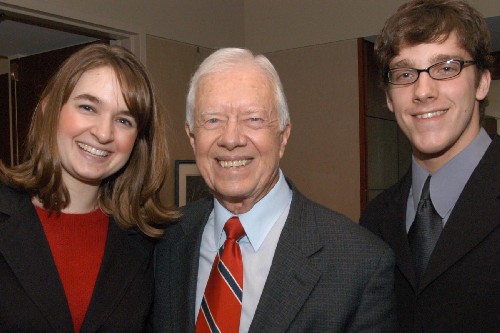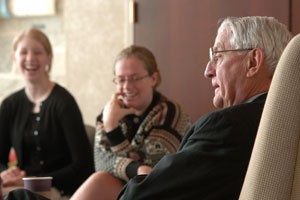| Posted: Feb. 25 2005,21:15 |
If you wrote this report, you will find a button here that you may click
in order to make changes in the report. 
|
PROGRESS: Has your organization seen
progress toward a culture of peace and nonviolence in your domain of
action and in your constituency during the first half of the Decade? |
In
the past 5 years 7-8,000 persons have attended the annual Nobel
Peace Prize Forums, continuing a 17 year tradition. Most
of the attendees are college students who then move to many parts of
the USA and the world to work and to live. It is
impossible to measure precisely what effect this might have, but seeds
of peace and nonviolence have been planted.
|
OBSTACLES: What are the most important obstacles that have prevented progress?
|
Lack
of a visible goal and accompanying program for the Decade makes it
difficult for some participants to see the connections to the Decade.
Nevertheless, the Nobel Peace Prize Forum has promoted the concept of the Decade and will continue to do so.
Raising
money in support of the Forums has become more difficult in recent
years. Conservative donors do not like to contribute to peace
issues which they consider liberal.
|
ACTIONS: What actions have been
undertaken by your organization to promote a culture of peace and
nonviolence during the first half of the Decade?
|
In
cooperation with the Norwegian Nobel Institute, five Midwestern
colleges of the Evangelical Lutheran Church in America sponsor the
annual Nobel Peace Prize Forum. This prestigious event is the Norwegian
Nobel Institute's only such program or academic affiliation outside
Norway.
Location of the Forum rotates
between the colleges: Augsburg College (Minneapolis, MN),
Augustana College (Sioux Falls, SD), Concordia College (Moorhead, MN),
Luther College (Decorah, IA) and St. Olaf College (Northfield, MN)
The colleges, all founded by Norwegian immigrants, sponsor the
forum to give recognition to Norway's international peace efforts and
to offer opportunities for Nobel Peace Prize laureates, diplomats,
scholars, and the general public to share in dialogue on the dynamics
of peacemaking and the underlying causes of conflict and war.
Begun
in 1989 , the Nobel Peace Prize Forum's stimulating array of programs
have involved over 21,000 participants and reached a much broader
audience through national and regional media coverage.
Among the many who are inspired by the forums, students perhaps
receive the greatest impact. Exposure to world leaders who work
tirelessly for peace can be life-changing as young people learn that
peacemaking is both possible and honorable. When students and other
forum participants see and hear Elie Wiesel, Oscar Arias Sanchez, Jimmy
Carter, Rigoberta Menchu Tum, Jody Williams, and David
Trimble, the messages of peace and peacekeeping become even more
personal and powerful. In fact, the colleges note a connection between
the Nobel Peace Prize Forum and the increasing number of their students
studying abroad or pursuing volunteer service at home or overseas upon
graduation.
Each Forum has the title "Striving
for Peace" with a second focus that reflects the interest and
work of the Peace Prize Laureate from the year before who is
being honored that year at the Forum. Sub-titles in the past 5
years have been: Risk and Reconciliation, Crossing
Borders/Challenging Boundaries, Who is Responsible?, A World Without
Borders,
Roots of Change, Uniting for Justice.
In addition to the plenary speakers, students and faculty
of all 5 colleges as well as persons from the general public present
seminars on topics relating to the theme of the year as well as to
peace work in general. A sufficient number are offered so that
enrollment can be kept to a size that encourages active participation
by all.
Each Forum has a Peace Prize Fair where Forum
attendees can learn about a wide variety and number of peacemaking
groups.
The theme of each Forum is also expressed in a variety of arts: dance, visual arts, music, drama.

President and Nobel Peace Prize Winner Jimmy Carter and students.

|
ADVICE: What advice would you like to
give to the Secretary-General and the General Assembly to promote a
culture of peace and nonviolence during the second half of the Decade? |
The
United Nations, UNESCO and the Decade for a Culture of Peace and
Nonviolence would do well to work with the concepts of the Nobel
Peace Prize Laureates (as the Nobel Peace Prize Festival does).
Schools, classes choose a laureate to study in depth, learning what
that recipient has done. They then share with others who have
studied other Laureates what they have learned.
From a focus on models of effective peace workers we
can learn ways to achieve justice and peace in our own areas.
|
PARTNERSHIPS: What partnerships and
networks does your organization participate in, thus strengthening the
global movement for a culture of peace? |
--The
Norwegian Nobel Institute (Oslo, Norway) is a co-sponsor with the 5
colleges of the Forum. This association is the only one the
Institute has outside Norway.
--World Citizen, Inc (which
sponsors Peace Sites and Peace Poles at schools, public places (the
Minnesota Capitol, for example), and homes and has a peace
curriculum for public schools, directs the Peace Prize Festival,
an event that parallels the Forum for students in k-12.
Each school/class studies a chosen Peace Laureate and then
presents the material at a table where students can learn about the
other laureates.
A program of music by the children, speeches by
Forum plenary speakers, other peace makers and a Fair of booths
of peacemaking groups (representing local, state, national and
international groups) is also a part of the Festival.
|
PLANS: What new engagements are
planned by your organization to promote a culture of peace and
nonviolence in the second half of the Decade (2005-2010)? |
The
Forums will continue in a similar pattern. Each new Laureate will
be invited to come for the Forum. Wangari Maathai has already
accepted the invitation to be at Luther College, Decorah, Iowa,
next February.
|
Postal address of organization
|
Luther College
700 College Drive, Decorah, IA 52101
|
E-mail address of organization
|
|
Website address of organization
|
http://www.luther.edu/
|
Highest priority action domain of a culture of peace
|
Education for a culture of peace
|
Second priority action domain of a culture of peace
|
Human rights
|
Highest priority country of action (or international)
|
|
Second priority country of action (or international)
|
|
| Back to top |
|





